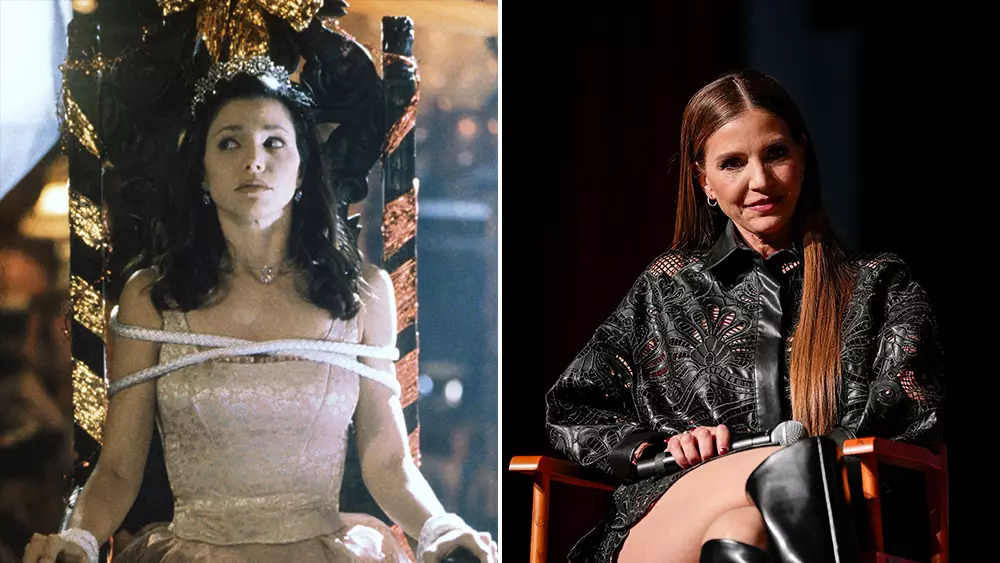The entertainment landscape is increasingly dominated by reboots and reimaginations of beloved classics, often simmering with anticipation and speculation among fans eager for continuity or nostalgic revival. The recent chatter surrounding a new Buffy the Vampire Slayer reboot exemplifies this phenomenon—an insatiable hunger among audiences to revisit familiar universes. However, this longing is frequently laced with misinformation, fueled by social media buzz and fan fervor, which can lead to false hopes or misunderstandings about involvement by original cast members. Charisma Carpenter’s candid remarks serve as a critical reality check amid this whirlwind of excitement, reminding fans that not every rumor is rooted in fact.
Her succinct clarification underscores a vital truth: participating in a reboot or revival is a complex decision influenced by numerous contractual, creative, and logistical factors. Carpenter’s straightforward denial reveals how rumors spread and how actors, despite their connections to iconic roles, are not always part of these projects. It also emphasizes the importance of waiting for official confirmation before prematurely heralding cast returns. Her transparency stands as a reminder that even beloved characters like Cordelia Chase remain uncertain until production companies make concrete announcements, highlighting the delicate balance between fan expectation and creative reality.
Charming Misinterpretations and the Power of Fan-Fueled Narratives
The naming of Carpenter’s Buffy rewatch podcast, “The Bitch Is Back,” introduces an interesting layer into the conversation. Initially, some fans speculated that the provocative title might be an allusion to her returning as Cordelia in the reboot, considering her historical significance in the Buffyverse. Yet, Carpenter clarified that the title’s choice was purely personal and unrelated to any potential participation in the new series. This situation underscores how fans often project implications onto seemingly innocuous creative choices, sometimes interpreting benign decisions as Easter eggs or subtle hints.
Such misinterpretations reveal the fervent desire for continuity, where fans desperately seek clues or signals from actors to affirm their hopes. Carpenter’s experience demonstrates how easily casual branding or personal projects can be misconstrued as signs of involvement, which inadvertently fuels false narratives. It underscores the necessity for celebrities and creators to communicate transparently to dispel misconceptions, emphasizing that enthusiasm for a project must not overshadow clear, honest dialogue.
The Unfinished Business of Character and Legacy
Carpenter’s comments also resonate with her own history in the Buffy franchise. Her character, Cordelia Chase, was an original fixture of the series, and her subsequent appearances in the Angel spinoff cemented her legacy. Given the series’ tendency to resurrect deceased characters—a hallmark of the Buffyverse—speculation about her return persists, driven by a nostalgic desire to see old favorites reappear. Carpenter’s openness about hopefulness and the feeling of an “unjust” ending for Cordelia highlights how fans’ emotional investments create a need for re-exploration and redemption.
Her statement invites a broader reflection on the narrative resilience and flexibility of Buffy’s universe. Can characters who have died truly come back, or does this diminish the weight of storytelling? The franchise’s history suggests that death is often a temporary setback, yet for the actors and fans who believe in meaningful storytelling, each potential return carries emotional stakes. Carpenter’s stance acknowledges her affection for the character and her hope to see her revisited, but also respects the reality that such decisions are ultimately in the hands of the writers and producers.
The Future of Buffy and Its Cultural Significance
The upcoming Buffy reboot, with its high-profile director and talented cast, signifies why the franchise continues to hold cultural relevance. Despite the complexities surrounding cast participation, the fact remains that Buffy’s themes—female empowerment, supernatural legacy, the dichotomy between good and evil—are timeless and adaptable. The involvement of acclaimed filmmaker Chloé Zhao suggests a fresh perspective, likely aiming to resonate with both nostalgic fans and new audiences.
However, the tension between maintaining the essence of the original series and forging new storytelling directions remains palpable. Original cast members’ participation—or lack thereof—will significantly influence the reboot’s reception. The franchise’s ability to evolve without alienating its core audience depends on authenticity and thoughtful storytelling rather than mere nostalgia nostalgia. Carpenter’s principled stance exemplifies a broader sentiment that respecting the integrity of the storytelling is paramount, even if it means sitting out the current reboot.
The saga of Buffy and its legacy continues to evolve, revealing both the enduring power of its characters and the complexities involved in rebooting beloved franchises. While fans eagerly await official updates, it’s clear that genuine engagement, honesty from creators, and a balanced respect for the original material will determine whether this new chapter enriches or dilutes Buffy’s storied history.
